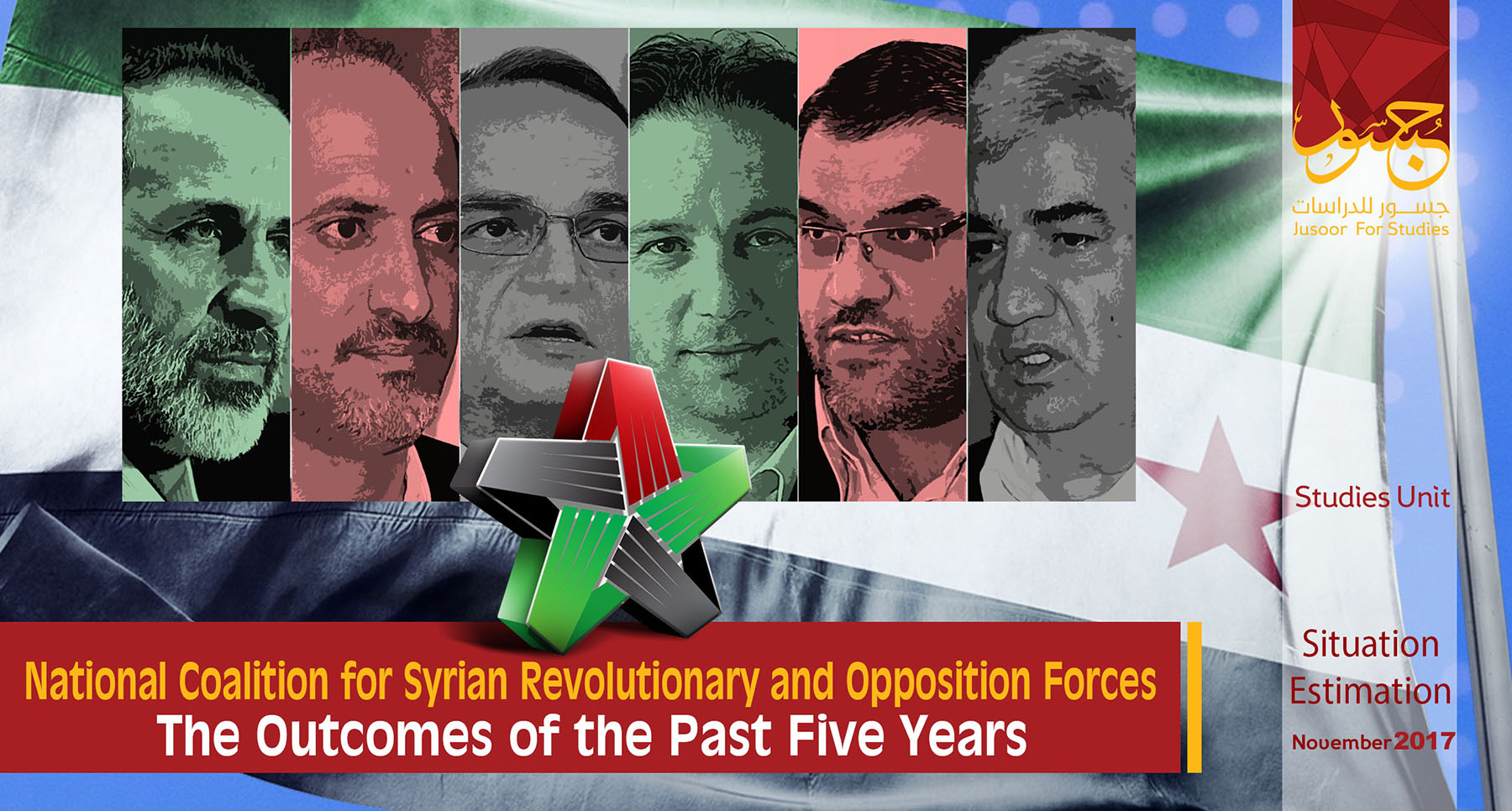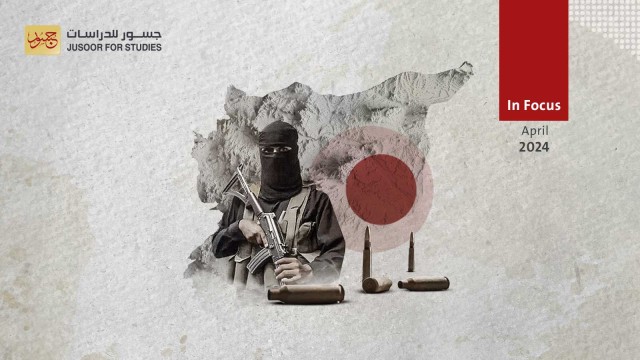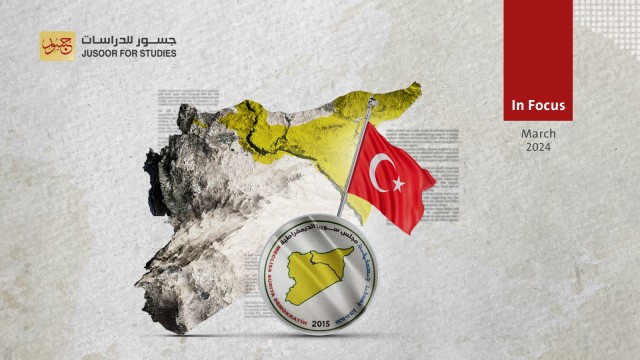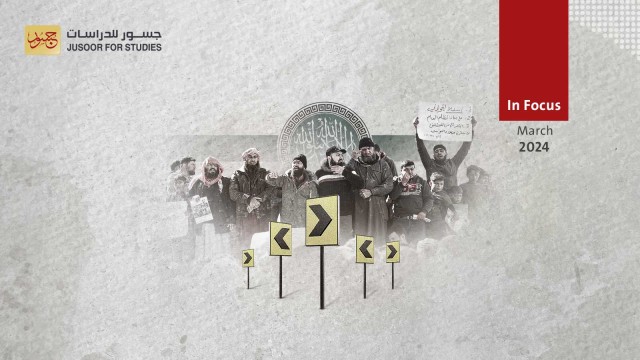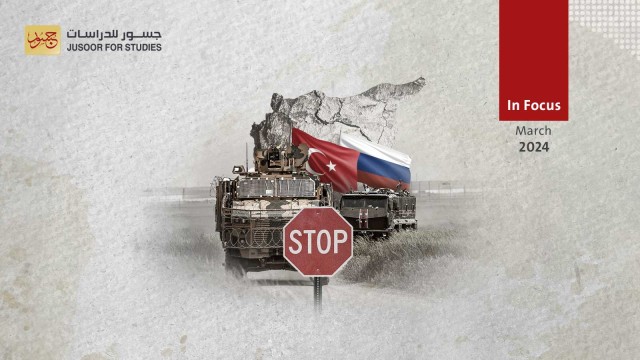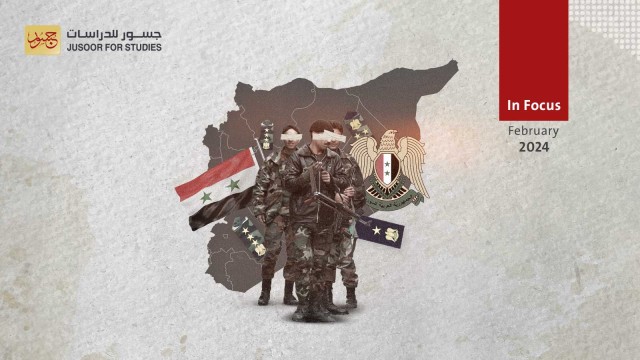National Coalition for Syrian Revolutionary and Opposition Forces The Outcomes of the Past Five Years
Preface
The foundation of the Syrian National Council (SNC) took place in the fourth quarter of 2011 and its supporters put hopes and high expectations towards the performance of the council. However, the grass-roots’ support has decreased swiftly due to the council’s poor achievements that varied as follows: the inability of providing no-fly zone or even a military intervention that can remove Al Assad’s regime and protects Syrians, the internal disputes between SNC’s components have risen due to the desire of some of the executive office members in removing and replacing this council with a new political body, lack of a clear vision about the political solution or the form of the Syrian State in the future, and the emergence of the political Islam along with the extreme armed groups which was faced with apathy by SNC.
The lack of understanding the Communique of Geneva 1 was SNC’s biggest strategic mistake, while the International community wanted to split the governance between the Syrian regime and opposition despite the international awareness that the popular uprising in Syria seeks civil and plural state without Al Assad’s regime who was desperate to bring the situation back to early 2011 thus, the International Community dominance on the course of events in Syria was obvious while the Syrian Revolution could not achieve more than half of the popular demands.
SNC’s practical rejection of the Geneva 1 outcomes was the nail in the coffin because it hindered the formation of the follow-up commission which was supposed to declare its approval of Geneva 1 communique in order to start the negotiations in the upcoming phases. This situation forced the International Community to replace SNC.
The above-mentioned situation has led to the emergence of the National Coalition in order to raise the expectations of the supportive grass-roots who was already disappointed with SNC’s performane, whereby Moaz Al-Khatib, who has a great reputation among Syrians, was appointed as a president of the coalition. It is worth mentioning that Moaz has no affiliation to the political setting who founded SNC or other political blocs.
After seven months of its establishment, the positive atmosphere of founding the National Coalition has declined, while the supporting States obliged the coalition to be enlarged in order to reform its internal structure and represent more Syrian components. The expansion process took place with the presence of diplomatic and security participation at the highest level which made the political setting believe that big decisions and decisive political arrangements with regards to the Syrian crisis would be made!
However, the following months witnessed an absence of any positive change in the performance of the Syrian coalition or the position of regional and international actors. The Syrian Coalition’s status has continued to decrease and turned into a small component that relates to the High Negotiations Committee (HNC) end of 2015, as the last party has revoked the coalitions’ authorities such as negotiation and became at the same level with level the coalition in regards to representation and legitimacy.
This report analysis the fifth anniversary of establishing the Syrian National Coalition alongside its achievements and the reasons behind its failure during the past five years, whereby it has changed from legitimate representative of Syrians (since Marrakesh Conference) into mere political platform which seeks an elusive recognition due to the presence of strong platforms and bodies.
First: The Formation and Process of the Syrian Coalition
The formation of the National Coalition for Syrian Revolutionary and Opposition Forces was announced in Doha on November 11, 2012, by many political forces and opposition figures. Moaz Al Khatib was elected as president of the coalition and his deputies were Suheir Atassi and Riyad Al Asaad.
The coalition partook in the 4th conference of the Group of Friends of the Syrian People in Marrakesh city on December 12, 2012. The conference was attended by 120 States as the largest international meeting until this day, while the coalition was able to attain an international recognition of being a legitimate representative of Syrians.
On the 31/5/2013, the coalition was forced to expand itself as a result of nine days of constant meetings that Syrian Democratic Platform, foreign ministers, high-level officials, intelligence apparatuses of many countries, and ambassadors of many countries took part in them. The expansion of the coalition has led to the presence of 43 new members and the total number became 114.
The aim of the enlargement is to rebalance the internal structure of the coalition in order to represent wider spectrum of Syrians in addition to guaranteeing a balance between the regional and international countries and allocating the burden of the Syrian crisis between these actors.
Moaz has resigned after four months and a half of assuming his position (through a statement on social media) but he has reversed his decision and continued his presidency of the coalition sporadically. On July 6, 2017, Ahmad Al Jarba became the new president of the National Coalition and continued for two mandates after that, Hadi Al Bahra was elected on the 9/7/2014 for one mandate only, while many successors became presidents in the coalition as follows: Khaled Khoja for two mandates on January 5, 2015, Anas Abda for two mandates on March 5, 2016, and Riyad Seif until this day, as he was elected on the 6/5/2017.
The coalition has witnessed many resignations and dismissal, the most notable incidents were: suspending the membership, retreat, and boycotting, whereby many members froze their memberships in the coalition for different durations while the same members have suspended their memberships for three or four times. The former situations were not followed by resignations and the coalition’s members were presenting different reasons for freezing their memberships. It was notable that members used only social media to announce the suspension of their memberships.
Freezing the membership was followed by retreating or disassociation without any resignations in the coalition, as many members and former presidents of the coalition have abstained from attending any meeting or activity for years but they did not resign. It is worth mentioning that some of those members said that the coalition does worth our resignation.
On the other hand, many members have resigned officially such as Michel Kilo, Ali Sadreddine Al-Bayanouni, Moaz Al Khatib, and Ahmad Al Jarba.
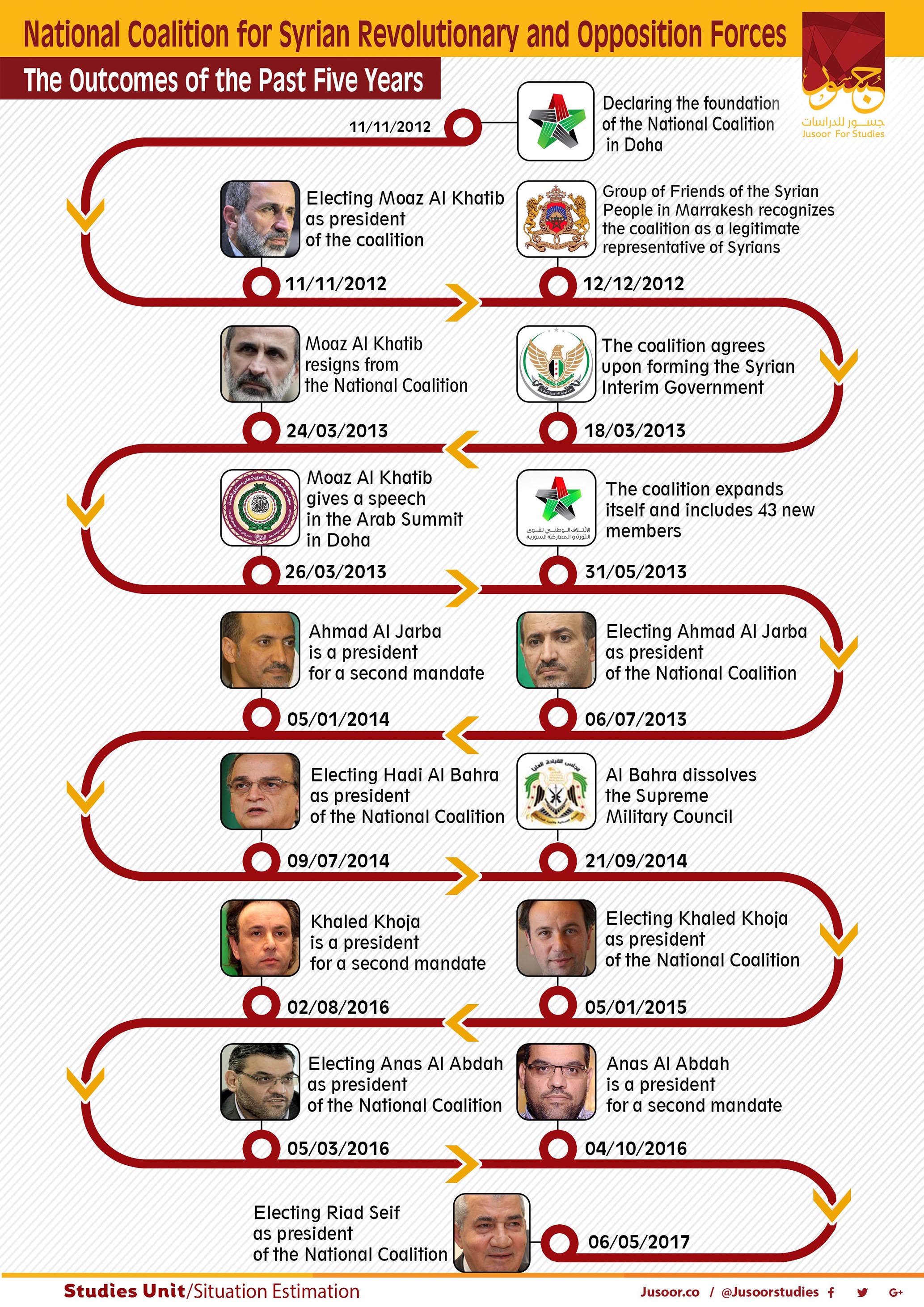
Second: The Most Significant Achievements
The National Coalition was able to attain many achievements at political and humanitarian levels in addition to some accomplishments at service level. The most notable achievement were as follows:
1. The Political Representation of the Syrian Opposition
The coalition has appointed many representatives (as embassies) in some countries such as U.S, Britain, France, Germany, Belgium, and Qatar. While Qatari Government recognized the representative as an official embassy for Syrians and granted it full diplomatic rights.
Many embassies have closed between 2014 and 2015 due to cutting off the financial support which was available when Mustafa Sabbagh assumed the position of Secretariat during Moaz Al Khatib and Ahmad Al Jarba reigns. The external funding cease was due to disputes between the coalition’s components.
2. Representing the Syrian Opposition in Geneva Communique
On January 22, 2014, the second round of Geneva Negotiations was considered one of the most notable turning point for the course of the National Coalition because it was the only representative of the Syrian Opposition (that time) who directly negotiated its counterparts from the Syrian regime, whilst the next negotiations have become indirect and neither HNC nor the National Coalition has the ability to represent the Syrian opposition without the involvement of other sides.
The coalition’s participation in Geneva 2 had increased its popularity. However, 44 members had frozen their memberships because they considered this conference as “a chance for imposing Geneva’s resolutions on Syrians and the Syrian Revolution by the conspiring world”; Nasr Al Hariri, who became head of the Syrian opposition’s delegation in the following Geneva Negotiations, was among those members. George Sabra, who became the president associate of HNC, declared the emergence of the National Coalition on the account SNC!
3. Reaching Understandings with Other Opposition’s Spectrums
The exiled Syrian National Coalition agreed with the Kurdish National Council (KNC) for acknowledging a joint document which included KNC in the National Coalition in November 2013. Furthermore the coalition was able to reach understanding with the domestic National Coordination Committee for the Forces of Democratic Change (NCCDC) and the Kurdish National Council (KNC), as they formed the “drafted a ten-term document” in Cairo in 2015, while Paris Conference witnessed some amendments and acknowledgement of this document, as the National Coalition and NCCDC presented a “road map for the political solution” which stated that the reference of the political solution should be based on the outcomes of Geneva Communique and the international resolutions that relates to the Syrian Issue.
These understandings had bolstered the national discourse within the Syrian opposition in addition to consolidating the understating with an extensive spectrum of Syrians even those who disagree the principles of the coalition.
4. Facilitating the humanitarian and aid projects
Presenting support was one of the coalition’s main tasks despite the fact that the humanitarian and aid work is not related to the National Coalition’s major objectives. A special unit was established in 2012 by the coalition itself after receiving request from donor. The unit is called Assistance Coordination Unit (ACU) and led by Suheir Atassi.
ACU attained 3 million dollars of aid and supervised many humanitarian projects. Moreover, ACU had a pioneering role in the emergence of the development projects that many aid organizations were unable to provide. It worth mentioning that ACU received a flour shipment (cost more than 300 million dollars) from Saudi Arabia.
The nature of ACU’s work has cause disputes between the components of the National Coalition who aimed at controlling the unit and making use of the available support for their personal interests. ACU’s presidency took advantage of the international pressure in order to gain administrative autonomy and break off the dominance of the National Coalition. This situation has caused administrative, organizational, and financial problems.
Third: The Most Prominent Failures
It is certain that the National Coalition does not have any real influence on the Syrian political scene nowadays and its role is limited, as it has lost the international and regional support thus, it is unable to hold any meetings with high-level figures from the backing countries. The above-mentioned is a clear indication of the coalition’s declining ability to achieve or influence.
The terms below summarize the events that the coalition went through during the past five years and illustrates the reasons behind the coalition’s failure as follows:
1. Failure in Vision-Building
Having a vision is the main pillar for any project or institution that helps them in forming and fulfilling their objectives!
Despite the frequent request from the representatives of the backing countries for a clear vision about Syria, after Al Assad’s departure, the National Coalition and its political body have failed to present any vision or even an integrative project that reflects the aspirations of the coalition’s supporters.
The absence of such vision made regional affiliations of the National Coalition’s president guide the coalition, who tried to glean the international trends towards each political stage regardless the nature of the current realities.
2. The Internal Squabbles Has Wasted Plenty of Time
The internal squabbles and disputes between the coalition’s political blocs have wasted so much time, as the political body (the highest body in the coalition) has spent many weeks for holding a series of meetings without presenting anything significant for the Syrian issue.
The members were overwhelmed by the disputes and only 20 members were attending the meetings in regards to the Syrian detainees’ issue. While all members of the coalition attend the meetings of an internal nature and those who cannot attend in person use communication to affirm their presence or even delegate their opinions to other members in the coalition.
The above-mentioned situation has led to disrupting the work of coalition’s political institutions for many times including the Syrian Interim Government (SIG), ACU, embassies, and representatives. Further, it has caused the cease of many projects and grants that other countries used to offer for Syrians.
For example, ACU was not able to disburse a 100 million dollar Qatari humanitarian grant due to these disputes, and the Qatar Foreign Ministry still has 26 million dollars from the first grant. Later on, the presidency of the coalition pressed to stop the expenditure of a part of the remaining amount of money for SIG due to the squabbles between the different blocs.
3. The Reliance on Individuals and Functional Blocs
The National Coalition was formed by individuals and groups that do not have any genuine intellectual framework and most of the coalition’s members have organized new functional blocs which have relations to individuals with political and financial influence, while the blocs were named after these individuals.
Some heads of these blocs give regular salaries to the members and other heads were presenting irregular grants or non-pecuniary rewards as per the members’ potentials.
These blocs and members have caused the emergence of alliances and disputes on the bases of personal grounds, whereby each individual tried to consolidate his/her position within the bloc in addition to securing their gains through the relatively stable quotas such as the membership of the political body or heading the offices, while they can also seek immediate quotas such as participating in a certain delegation.
4. The Lack of Transparency and the Good Governance
The National coalition has received a total amount of 200 million dollars excluding the amounts that ACU has received, as the last party has attained ten folds of that amount.
The National Coalition has failed to establish a clear administrative and financial system because the amounts did not enter any fund for the coalition at the first place. Mustafa Al Sabbagh was the responsible for these grants who used them to cover the expenses of his organization “The Syrian Business Forum” and he did not deliver any financial reports to his successor. After leaving the presidency of the coalition by Moaz, the grants are transferred to the coalition president or a group of members’ bank account because the National Coalition does not have any bank account!
The reviews of the coalition’s financial and administrative performance indicate that the Secretariat followed by the president had almost exclusive authorities with regards to disbursing the financial grants without consulting the political body or the Secretariat. However, the situation has changed recently and the body acknowledges the disbursement of the amounts.
Heads of the offices were able to use their financial allocations to expand and conduct external contracts without referring to the political body in the coalition. Further, some offices were enlarged such as the media office and its new capacity reaches more than 70 staff alongside many consultants and foreign staff.
Conversely, after an external pressure on ACU, the unit has assigned an external company in order to audit. The annual cost of the contract with the company has reached 300 thousand dollar despite the fact that many Syrian and regional companies can do the same tasks with lower costs.
5. Problem-related to the Representation
The National Coalition was founded by the quotas between many entities, blocs, and individuals as per the Syrian equation and the seats were distributed between these components, while each component attained a number of fixed seats with the ability of changing its representatives in the coalition at any time.
Generally, the selection of the representing components in addition to the number of seats are bound by the quotas between the negotiators and their ability to quibble along with the size of regional and international support that took place in Doha five years ago.
This situation mentioned above has granted groups (that almost exist) seats in the coalition because of their affiliation to one of the centers of powers. 14 seats were granted to non-elected or even non-existed local councils such as the local councils in Damascus, Tartus, Al Hasakah, Deir ez-Zor, and Raqqa.
The coalition has ignored dozens of correspondences from local councils in Hama and Aleppo who demanded seats in the coalition after conducting subsequent elections.
The constant change in the political and field map has caused the end of some groups such as “Board of the Revolution Trustees” and “The Syrian Revolution Public Authority”; however, the groups’ representatives kept their seats. Moreover, the same scenario took place in the SNC (its representatives have 18 seats) which practically ended after the foundation of the coalition.
The problem of representation is linked with the rules of procedure which lies behind the failure of the coalition in fulfilling its duties, while it has protected the members from accountability or even dismissal because the rules of procedure stipulates that two thirds of the votes are required to dismiss the president or the secretariats of the coalition while dismissing a member requires half of the votes plus one, this process is very difficult due to the sensibilities and balances between the blocs within the coalition.
Further, the rules of procedure confines the option of replacing any member with a decision from the original bloc that the member has affiliation to, for example, Muslim Brotherhood (MB) needs the approval of the SNC’s bloc in order to change one of its members which is impossible to happen because the council does not exist and that means MB must keep their current members.
The National Coalition was never able to replace the resigned members or even dismissing the members who abstained from partaking in the coalition’s activities because of the rules of procedures. The coalition has recently become able to replace them.
The rules of procedures does not specify organizational or administrative details, allowing the legal committee to have a wide margin for presenting interpretations and legal jurisprudence which turned into a type of overlap within the authorities of the coalition and became an opportunity for the blocs who already control the coalition. The most notable example is when the legal committee allowed the resolution of participating in Geneva 2 Negotiations to pass despite the fact that the rules of procedure prevented such approval.
6. The National Coalition has failed to administrate the Military Affair
The military action has formed the main factor of the coalition’s failure because many countries funded the armed factions away from the political window of the National Coalition thus, the coalition was prevented from attaining any military force on the ground and the armed factions could not have any political umbrella. These factions turned into political forces that compete the political umbrellas of the International Community.
The coalition has failed to deal with the externally-backed armed factions while representing the military forces in Syria is one of the most prominent failure of the National Coalition.
Expanding the coalition on May 31, 2013, has included the Body of Staff with 15 members as a step towards the military representation through the political bodies. However, this representation was rejected by the armed factions and some of the body’s representatives have become part of the political disputes thus, they were not able to represent the military component.
2015 witnessed the first coordination between the National Coalition and some factions. On the 25/4/2015, a consultative meeting was held between the coalition and a number of military factions along with other field presences and the both sides concurred the formation of “Follow-up and Coordination Committee ” after that, many similar meetings have taken place in addition to meetings within the newly formed committee.
On June 15, 2015, the public body of the National Coalition decided to form the higher military command in order to represent the active battalions and factions on the ground. Furthermore, the coalition decided to form a committee for establishing a new leadership as per certain criteria alongside freezing the Supreme Military Council and keeping the representatives only for the sake of forming a new command. Dr. Khaled Khoja was able to the loyalty of the military staff bloc representatives and guaranteed a second mandate for his presidency of the National Coalition.
These meetings helped the coalition in issuing joint political decisions in different occasions . It was notable that a convergence had taken place between the factions and the National Coalition after 2015, as the first party had a confined status and lost its ability to gain achievements on the ground and changed into small entities that seek a legitimate cover which protects them from any removal or military targeting!
7. Crisis of the Legitimacy and the Lack of Achieving
The lack of effective vision and the presence of internal squabbles among the coalition’s members had a negative impact on the National Coalition’s achievements comparing with the considerable size of the financial and political support that the countries offered between 2012 and 2014.
The National Coalition tried to raise the level of political discourse in order to be close to the revolutionary discourse as a replacement of the practical projects, while its media discourse became competitive to the discourse of the activists on social media as a step to attain a revolutionary legitimacy, in addition, directing the international attention away from the coalition’s poor achievement.
The future of the coalition.
Despite the high expectations and the considerable financial and political support for the National Coalition, its performance was poor.
The political and administrative performance of the coalition shows that it did not learn from the experience of the SNC, while the political role and rules of procedure of the coalition were worse than the SNC.
The current political realities show that the coalition’s representation for Syrians or the Syrian opposition is over at the practical level and turned into a political and media platform for the opposition that tries to compete the other medium-sized revolutionary platforms.
The members of the coalition have an unknown fate vis-a-vis the upcoming stage, whereby their political presence was confined with the National Coalition and they do not have any popularity among the grass-roots or even a regional support that can grant them quotas from certain actors in the future.
Margins:
The National Coalition, the first statement about the consultative meeting between the coalition and the armed factions, 28/4/2015
2- * The National Coalition, the joint position of the armed factions and the coalition towards the political realities, 28/9/2015
* The National Coalition, a joint statement about the latest developments and implications of the political process in Syria, 2/10/2015
* The National Coalition, the armed factions and the coalition retreat their commitments to the principles of the Syrian Revolution, 23/1/2016

